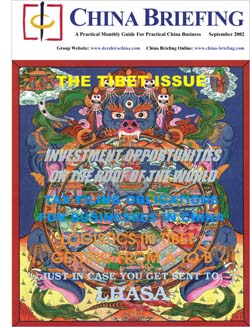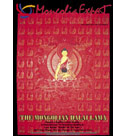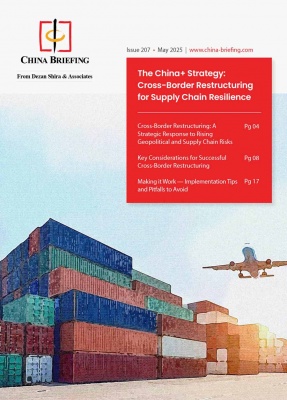The Tibet issue
 Foreign criticism often misguided
Foreign criticism often misguided
April 9 – With so much talk recently of Tibet for various reasons, and so much Western paranoia about even mentioning the name of the country (blogs running the name as T*bet or T1bet displays rather a lack of confidence, or a somewhat bizarre notion of harboring anti-China naughtiness. It’s almost become a trendy fashion to mistype the capital city that cannot, apparently be actually spelt for great fear of the Chinese police shutting them down) we decided to dig out an old, long deleted back issue of China Briefing about the investment environment there, which we ran in 2002 (click on cover to download the pdf).
Then, China Briefing hadn’t quite reached the glossy professionally produced standards it has today, but it was at the time – pre-blogging of course – pretty much the only source of China investment information available concerning FDI legal and tax issues about China, at least for free. 40,000 print copies were produced for this issue and distributed across China, and online. The issue followed meetings I had with the Tibetan autonomous regional government, at the time headed up by Guo Jinlong, the Party Secretary. Guo, now the mayor of Beijing, spent some time with me explaining the issues China faced with Tibet, and was a generous host, treating us to Tibetan banquets, dancing and singing. He was also obviously a man who enjoyed getting out and about in Tibet’s harsh sunshine; he had become very dark tanned indeed.
Essentially, although the Tibet issue is complicated (see the 2point6billion.com article “Oh Tibet – Who Will Buy Your Spirituality Now?” for the factual status behind Tibetan “independence”, and the evolution of the Dalai Lama) it was apparent that the Chinese were pouring billions of dollars in to assist with the development of the country. Not all of that, I have to say, was culturally sensitive, and much was the standard Chinese white tiled concrete buildings one sees as a depressingly unimaginative architectural site in many other Chinese cities. And here is the rub. Foreign critics, somewhat rampant in their condemnation of China’s role in Tibet, have pressured Western businesses not to invest in Tibet. In doing so, they just place the initiative on the Chinese to do so. It’s an absurd contradiction of intent.
One notorious case is that of the Holiday Inn in Lhasa, also the subject of the best business book written about Tibet, “Running a Hotel On The Roof Of The World: Five Years in Tibet” by Alec Le Sueur – a must read for anyone interested in the region. While the Holiday Inn thrived, (and Alec’s book tells stories of the first Miss Tibet pageant, of defrosting spring time dead rats aroma when the summer air conditioning got turned on, and of traveling around the region) a U.S.-based activist group began putting pressure on the Holiday Inn‘s shareholders to pull the chain out. Ultimately, they succeeded. The Holiday Inn is now the Lhasa Hotel, and purely Han Chinese run. What did the activists accomplish? Actually, several back steps that hurt the indigenous Tibetans. Many lost their jobs as the hotel became increasingly Chinese run; the Holiday Inn, to their credit, had employed a fair amount of locals. Not anymore.
The truth of the matter is, if the Western critics of China in Tibet want to influence matters, instead of just lambasting China, they should engage with it. Pulling foreign investment out of Tibet just hurts the Tibetans. As I wryly noted, some six years ago in China Briefing, “Too much has been written by unqualified people with hidden agendas over investments into Tibet and this is actively working against the preservation of the regions culture. Instead of wanting to blindly condemn any investment into the area, it would be far better to see the potential for development in an organized and sympathetic manner. Tibet needs this if it is not going to end up as a slovenly version of Kathmandu.”
Six years ago, there were no karaoke bars in Lhasa. Now there are. If Western companies do not invest, and if we cannot trust them to provide a culturally sympathetic investment, then the Chinese will. And who can blame them if Lhasa becomes more Han as a result? Sinicization is one by-product of activists creating a foreign investment environment that will not tolerate Western money in the country, and it’s a flawed concept to believe otherwise. The issue also featured a sentence I shall leave you with. “The West has a choice. Keep Tibet full of crap or help upgrade it to a decent standard of service and culture more in line with its proud heritage.” China bashing over Tibet doesn’t help. Engaging China with sensible, pragmatic dialogue and investing in Tibet would.
Related reading
Traveling in Tibet
Lhasa to Everest Base Camp / Tibetan Buddhism, The Kama Sutra, & Tantric Sex / The Road To Shangri-La / Guide To Lhasa
 China’s Route to India Via Tibet – The Ancient Tea Horse Route
China’s Route to India Via Tibet – The Ancient Tea Horse Route
The Cha Ma Gu Dao route from Yunnan, across Tibet and into India / Pu’er Tea / A visit to Sikkim and Tibet in 1873 / In the footsteps of Genghis Khan
 The Mongolian Dalai Lama
The Mongolian Dalai Lama
History of the Dalai Lama / The Sand Mandala / Mongolian Buddhism / Riddles of the Gobi Desert
Note: Dezan Shira & Associates services clients in Tibet and has done for several years, in both legal incorporation advice and tax filing issues. To contact the firm over Tibet investment issues please email info@dezshira.com.
- Previous Article Going West…
- Next Article Major Earthquake Hits Southwest China


























